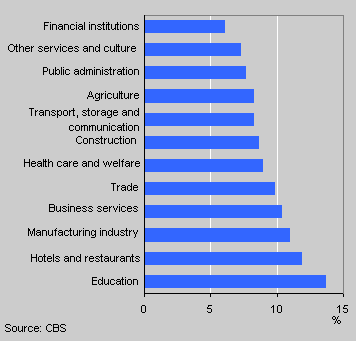Burn-out and psychological workload

In 2004 close to one in ten employees experienced job burn-out complaints about the same rate as in the previous years. Burn-out is most common in the sectors education and hotels and restaurants. A heavy workload, poor career prospects and lack of job autonomy are causing rampant job burn-out in these sectors.
Burnout hits men and women alike
The employed labour force comprises approximately 7 million people, some 700 thousand suffer from burn-out. The proportion of employees suffering from burn-out has been stable in recent years. Women and men suffer equally from job burn-out.
Employees suffering from burn-out by gender, 1999-2004
Burn-out widespread phenomenon in education and hotels and restaurants sector
Burn-out is more commonly found in some sectors than in others. In the period 2001-2003 the highest proportion of burn-out cases was recorded in the sector education (14 percent) and hotels and restaurants ((12 percent). With 6 percent, it was relatively low in the sector financial institutions.
Burn-out cases by sector, 2001/2003

Workload and career prospects decisive factors
The risk of burn-out is strongly related to the psychological workload. A heavy workload and poor career prospects affect the risk of burn-out. The risk of burn-out is 3.4 times as high for people with a heavy workload. The risk rate is 2.7 as high for employees with poor career prospects as for those with good job prospects.
Job autonomy also relevant
The risk rate for workers lacking job autonomy is 1.7 times as high as for workers who can take decisions independently. The relation between the risk of burn-out and career prospects and remuneration is less evident.
High psychological workload in sectors hotels and restaurants and education
Heavy workload, meagre career opportunities and a low degree of job autonomy are largely accountable for the high incidence of burn-out in education. The same is true for people employed in the sector hotels and restaurants.
Christianne Hupkens
